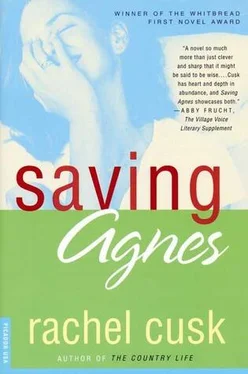The crack in the wall was getting bigger. It had begun to slope off to the left, wiggling crazily like a mountain path on a road map. Sometimes they could hear scratching and rustling sounds coming from within, and Agnes wondered if strange creatures might begin to squeeze out from between its jaws. Nina said it was mice. Merlin said it was sediment.
‘Shouldn’t we get something done?’ Agnes asked him one night.
‘No point,’ he replied, biting into a crescent moon of pizza. ‘The council are going to knock it down anyway. We’ll be long gone by the time the walls cave in.’
‘Where are we going to go?’ She sipped red wine and focused her mind on this future dilemma from the comfort of her armchair.
‘Dunno. I might buy a house, I suppose.’
‘Oh.’
Agnes, whose thoughts had been running more along the lines of the three of them with sleeping bags cosily bedding down in deserted shopping malls, was at a loss for words. The singularity of both his personal pronoun and his affluent future made her feel apprehensive. After a while, she said: ‘Merlin, do you get depressed at the thought of working? For ever, I mean.’
‘Not really.’ He put down his plate, now adorned with bare, smiling pizza crusts, and picked up his glass. ‘It depends what you mean. Do I find working in itself depressing — enough, say, to give it up and find an alternative way of life; or do I find the notion of eternity depressing, the idea that the only thing separating me from my own funeral is a load of paycheques. They’re two different things.’
‘Whatever,’ said Agnes irritably. ‘The first one.’
‘Do I find work innately depressing?’ Merlin sat back and rubbed his stomach. He had become rather pompous since he had started this job, she thought. That was what happened to men. Once they started wearing suits, they began to get their personalities off the peg too. ‘No, not really. I mean, it depends on whether you have anything you’d rather be doing.’
‘Well, everyone does, surely?’ said Agnes impatiently. ‘Everyone would rather go to the beach or watch a movie than sit in an office, wouldn’t they?’
‘To a point, yes. But day in and day out, I don’t know. It’s easier if you’re rich, probably. You can cater to your own boredom thresholds.’
‘But rich people go on working, even when they can’t possibly spend all the money they’ve made.’ Agnes wondered why she never met people like the ones she referred to so often in her arguments. ‘I would never do that.’
‘That’s why you’re not rich,’ said Merlin. ‘For rich people, money is the most interesting thing in the world. They enjoy making it. For everyone else — well, it’s a means to an end, I suppose. A way of eating and buying what you need and having a holiday. And a way of passing time.’
‘That’s it!’ Agnes shrieked, banging the table top so that a wave of wine from Merlin’s glass slopped over the rim into a blood-coloured puddle. ‘That’s exactly what I mean! Passing time — don’t you find that depressing? I mean, if all we’re doing is trying to pass time, why don’t we just kill ourselves?’
When she was younger, that sort of comment would have aroused groans and sighs from Agnes’s family. She was so melodramatic, they would complain. Why did she have to get so worked up about everything? Merlin smiled.
‘Absolutely,’ he said. ‘Why don’t we? Come on, Agnes — you hate your job. Why don’t you kill yourself?’
‘Well.’ Agnes considered the question, which had been pronounced more in the spirit of intellectual debate than active encouragement. ‘I suppose I believe that things will get better. If I knew I had to do this for ever, it would be different.’
‘Exactly,’ said Merlin. ‘And that’s the pleasure principle. Things are more valuable if they’re rare. Just imagine if you had to go to the cinema for ever or lie on a beach all day for the rest of your life. Imagine if we spent all our time on holiday and then went to work for two weeks a year. Work would be the high point of our lives. That would be awful.’
‘Maybe,’ conceded Agnes, although secretly she thought she could bear it.
‘I once heard someone on the radio being asked what he would take with him if he had to spend the rest of his life alone on a desert island,’ Merlin said presently. ‘A beautiful island, mind you, with palm trees and stuff, but nothing else. You know what he said?’
‘What?’
‘He said he would take a gun. To shoot himself with, that is.’
‘That’s really dumb,’ said Greta when Agnes told her Merlin’s story. ‘Why didn’t he just take a plane with him to get him off the goddamned island?’
Her lover hadn’t called now for two weeks. Agnes knew that the reasons underlying his lapse would not, if known, be likely to reveal anything in her favour, and she clung to the mercy of his silence as well as, more obstinately, to the hope of its interruption.
Tom called to say that he was going to visit their parents in East Anglia on Saturday, and as her only weekend plans thus far had been to spend it fending off all arrangements lest her lover should call and want to see her, she agreed in a fit of pique, as Friday brought the unsullied vacancy of the ensuing two days perilously near, to accompany him.
Tom drew up outside her house in a car as handsome and glossy-flanked as a racehorse, and as he bore her off within it, Agnes lived out with vicarious satisfaction the thought of her lover calling to be told she had gone away. It occurred to her then that her pleasure at the idea of his doing so was of a really rather secondary variety, and furthermore that he might share some of it on receiving news of her departure.
She looked out of the window. The city clung interminably to the roadside, grey and elastic as old chewing gum. They drove through parts of London she had never even heard of, battered strings of shops and houses nestling in motorway intersections or beside underpasses, festering round tatty overground stations with foreign-sounding names. They passed vast tower-blocks festooned with washing lines, purple sheets fluttering in the breeze like flags. Agnes wondered what one had to do to end up behind one of their slit-eyed apertures.
‘Awful, isn’t it?’ said Tom, putting his foot down on the accelerator. ‘Poor sods.’
Their parents were waiting for them at the end of the smooth gravel drive which wound its way to the front of the house, feigning involvement with the herbaceous borders. They liked to present an active image of country life. At the sound of the car, they looked up and waved distractedly, trowels in hand.
‘Keep digging, slaves!’ yelled Tom out of the window. ‘You’ve got half an hour to grow lunch.’
Agnes got out of the car. After months of concrete and tarmac the green of their garden was hallucinogenic. Giant trees posed along the drive like old movie actresses, their gnarled and hysterical limbs dripping with red and gold curls of leaves. The lawns rolled and billowed out beneath them, the manicured stretches of their garden giving way to the rougher fields beyond. Her parents’ small farmhouse lounged comfortably amidst this splendour. It had large windows fringed with frenchified shutters, coquettish as false eyelashes. Agnes thought of those captives of the tower, their lives grim and phallic and seasonless beside all this fecundity, and for a moment she burned with shame.
‘Your problem, Agnes,’ Nina had once said to her, ‘is that you don’t want to be like everyone else. You want everyone else to be like you.’
‘Agnes, you’re not eating,’ said her mother when they sat down to lunch. ‘What’s the matter? Don’t you feel well?’
Agnes was forced by her words to recall several past occasions when, by disdaining nourishment, she had drawn similar polite inquiries.
Читать дальше












